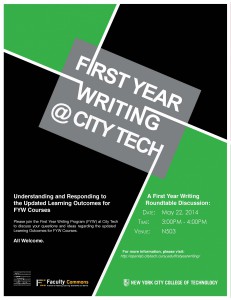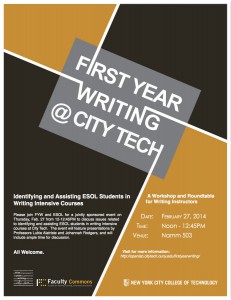At October’s FYW Professional Development Workshop, several instructors expressed their interest in having a list of Recommended Books for the ENG1101 course. In an effort to respond to this request, FYW@City Tech is compiling information about full-length monographs that have been used in ENG1101 courses at the college. Many of these books may also be of interest to instructors across the disciplines interested in General Education and Coordinated Interdisciplinary Readings and Assignments:
Kevin Roose, The Unlikely Disciple: A Sinner’s Semester at America’s Holiest University (2009). [C. Harris/Nov. 2013]
As a journalism major at Brown University, Kevin Roose, who grew up in a secular Quaker family, is curious to bridge what he calls the “God divide” in the United States and lands on the idea of enrolling for one semester at Jerry Falwell’s Liberty University in Lynchburg, Virginia. Roose decides to go undercover–to hide his secular orientation in order to learn about the “authentic” experience of evangelical student life. Embarking on a bold project of undercover journalism, Roose relates his experiences with Liberty students, at times funny, at times poignant, both in and out of class. There is a surprise aspect to the ending (I won’t spoil it!) that adds to the book’s suspense and keeps students reading to the end.
Roose’s idea-rich book provides students with the vocabulary to talk about different kinds of institutions (public vs. private, secular vs. religious, commuter vs. residential), to understand the hierarchy within an institution, and to see City Tech in relation to other colleges and universities. It also allows students the occasion to write analytically about their own experience.
Patricia Klindienst, The Earth Knows My Name: Food, Culture, and Sustainability in the Gardens of Ethnic Americans (2006). [C. Harris/Nov. 2013]
Master gardener Patricia Klindienst, who also teaches creative writing at Yale University, toured the United States in order to interview a variety of ethnic Americans on their gardening practices. She learns that gardening helps people who might otherwise feel “transplanted” or alien maintain their culture and create community. Gardening thus takes on political significance and enriches our sense of democracy. In her Introduction she tells how she discovered the family secret of her own Italian-American clan that led her to this project.
With every chapter Klindienst includes a brief history of the culture explored, from native Americans in New Mexico to the Gullah people off the coast of South Carolina to Polish-American vinters and Japanese-American in Washington State. Each chapter stands on its own but gains in depth when read as part of the whole book. I taught this book twice in ENG 1101 as part of a Learning Community with Biology in tandem with field trips to the Brooklyn Botanic Garden. We read the first two or three chapters together, and then students chose one of the other chapters as part of a research project.
Wangari Maathi’s memoir Unbowed (again, as part of a Learning Community with Biology) [C. Harris/Nov. 2013]
This fascinating memoir, written by the founder of the Greenbelt Movement in Kenya and 2007 Nobel Peace Prize winner (who worked with Al Gore on environmental issues in Haiti), is particular poignant for me to think about since Maathi has died since I last taught it. I had students read several chapters as a way to teach them how to write a summary for the ENG 1101 final exam. In Fall 2007 I also took students to hear her speak when she came to the Natural History Museum in Manhattan. This book would pair well with writings by Kenyan author Ngugi wa Thiong go as Maathi connects environmental justice with colonial makes the case for that environmental damage caused by colonial practices cannot be healed without educating the people on their own history and culture.
Mary Shelley, Frankenstein. [J. Rodgers/Nov. 2013]
While this book obviously needs no introduction, it can be a difficult one to teach, a fact I learned first hand when using it in an ENG2150 course. Nevertheless, the book also seems like an ideal one for undergraduates at City Tech to engage with from multiple disciplinary perspectives. For those interested in teaching the book or some very interesting titles related to it, please refer to a list of resources related to teaching it here.
Charles Bazerman, A Rhetoric of Literate Action. [J. Rodgers/Aug. 2014]
For those interested in exploring a “writing about writing” approach to the composition course, I strongly recommend taking a look at Charles Bazerman’s 2014 Open Access book about writing and communication somewhat–depending on your perspective–unfortunately titled A Rhetoric of Literate Action. I have nothing against the title of the book in theory. However, in practice, as a book written for a “advanced writers,” and apparently intended for undergraduates who may fall into that category, it seems another title might speak more immediately and directly to the targeted audience. Nevertheless, this is a fascinating book about writing and communication as processes and the status and function of writing in society generally and in the academy specifically.




